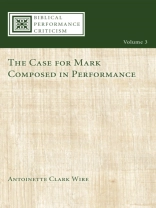Is it possible to make a case that the Gospel of Mark was not composed by a single man from scattered accounts but in a process of people’s telling Jesus‘ story over several decades? And what can we say about the tellers who were shaping this story for changing audiences?
After an introduction showing the groundwork already laid in oral tradition research, the case begins by tracing the Mark we know back to several quite different early manuscripts which continue the flexibility of their oral ancestors. The focus then turns to three aspects of Mark, its language, which is characterized as speech with special phrases and rhythms, its episodes characterized by traditional forms, and its overall story pattern that is common in oral reports of the time.
Finally several soundings are taken in Mark to test the thesis of performance composition, two scenarios are projected of possible early tellers of this tradition, and a conclusion summarizes major findings in the case. Mark’s writer turns out to be the one who transcribes the tradition, probably adhering closely to it in order to legitimate the new medium of writing.
Über den Autor
Antoinette Clark Wire is Robert S. Dollar Professor of New Testament at San Francisco Theological Seminary where she has taught since 1973. Dr. Wire is a graduate of Yale Divinity and Claremont Graduate School. Raised in China by missionary parents, she has lived her adult life largely in California. Her most recent book is ‚Holy Lives, Holy Deaths: A Close Hearing of Early Jewish Storytellers.‘







![Cover von Brian Schrag & Julisa Rowe: Community Arts for God's Purposes [Chinese] 貼近神心意的社群藝術 Cover von Brian Schrag & Julisa Rowe: Community Arts for God's Purposes [Chinese] 貼近神心意的社群藝術](https://static.worldofdigitals.com/thumb_webp/740/9781645083740.webp)




